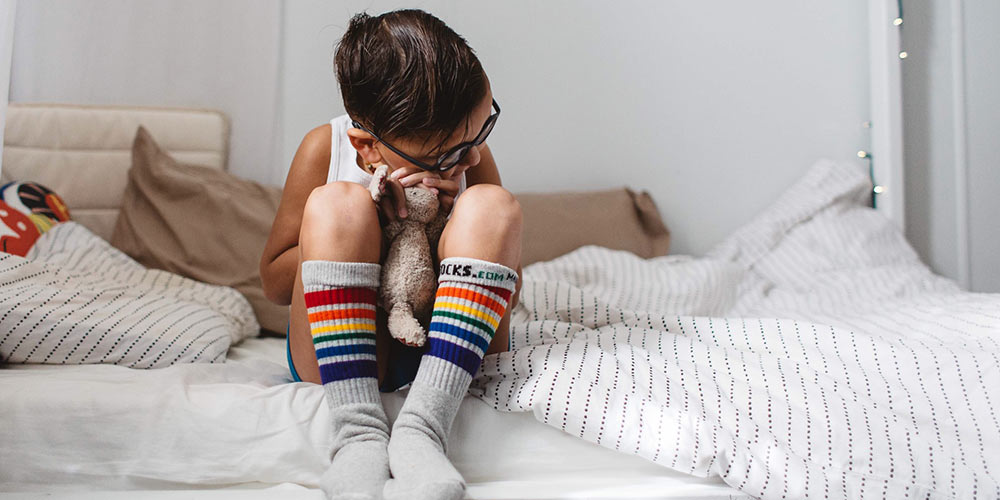There’s a P word I’ve always shied away from when using words of encouragement for children: “perfect.” It’s been a personal ball and chain that I’d never want to clamp around the ankles of my kids. But as they’ve gotten older and can understand grades, school performance, and goals, I’ve been wrestling with another slightly problematic P word: “potential.”
It’s not a bad word, and the intent behind it is good, but I wonder if what my kids hear when I say that they “have potential” is that they’re not enough right now. Here’s where you could be… if you worked harder. I believe our kids can be their best selves now if they work from a vantage point of confidence, not of doubt. So here are 5 words of encouragement for children to help them realize their potential (without saying it) and live it today.
1. “Are you proud of yourself?”
Repeating this helps our kids be their best selves by sparking intrinsic motivation.
For months, my son said he wanted to try out for the JV basketball team. When the time finally came, he got nervous and asked to back out. We pushed him to give it a try, and at the end of the week of tryouts, I said to him, “You stepped out of your comfort zone. That took courage. Are you proud of yourself?”
Telling your kids you’re proud of them is important. Our kids want to know they’ve pleased us. But asking your kids if they’re proud of themselves sparks intrinsic motivation. It prompts our kids to desire good character for themselves, not just because others see it or because they get praise for it. Intrinsic motivation is essential to having integrity and a good work ethic.
2. “You choose.”
Repeating this helps our kids be their best selves by giving them a sense of control.
Our kids don’t get a ton of say while they live under our roofs, but we don’t want to send our young adults out into the world unable to think for themselves. Michigan State University’s Child and Family Development extension found that choices can “strengthen adult-child relationships and empower children, helping them mature into more secure adults.”
Start small. Have your son pack his own lunch. If he asks, “Should I take Doritos or Cheetos?” say, “You choose. Which one sounds better?” Either way, come lunchtime, he’ll be licking delicious chip dust off his fingers, knowing he’d taken control.
3. “You have what it takes.”
Relating this helps our kids be their best selves by boosting their confidence.
My mother-in-law always told my husband’s sister, Elizabeth, she had a beautiful voice. It wasn’t until Elizabeth was a young adult and tried karaoke with friends that she realized her mom had not been truthful all those years. She couldn’t hold a note in a bucket! Still, Mom’s words helped her believe in herself and gave her the confidence to grab the mic.
Peggy O’Mara, editor of Mothering Magazine said, “The way we talk to our children becomes their inner voice.” Your voice saying that “you have what it takes” will become her voice saying I have what it takes as she faces all sorts of challenges. I have what it takes to make new friends, to climb to the next branch on the tree, and maybe even to sing karaoke.
4. “There’s room for mistakes.”
Repeating this helps our kids be their best selves by giving them permission to try new things.
In a survey conducted by One Poll, more than half of the parents polled view age 5 as the right time for kids to begin looking ahead to their future career paths. FIVE! If our kids have to start walking a career path four years after they physically learn to walk, it doesn’t leave much room for tripping and falling. If there’s no room for mistakes, each new step will be preceded by a terror-filled (and possibly paralyzing) “What if I’m wrong?”
Developmental psychologist Carol S. Dweck says, “If parents want to give their children a gift, the best thing they can do is to teach [them] to love challenges [and] be intrigued by mistakes…” I love that! What would happen if instead of saying “Oops, that’s not good!” when we made a mistake, we said, “Well, that was interesting! What did we learn?”
5. “You are loved.”
Repeating this helps our kids be their best selves by bolstering their identity.
I don’t think you can say the words “I love you” to your kids too much. But what if you sprinkle in a “You are loved” now and then? A small change in wording shifts the focus from what you feel to what they are.
As our kids grow and eventually separate from us, a stronger sense of identity will help them make healthier choices and bounce back from failure. And, sure, there are many facets to our kids’ unique identities, but “I’m loved” should be one they all claim with confidence.
What words of encouragement for children do you use with your kids to help them realize how amazing they are?










